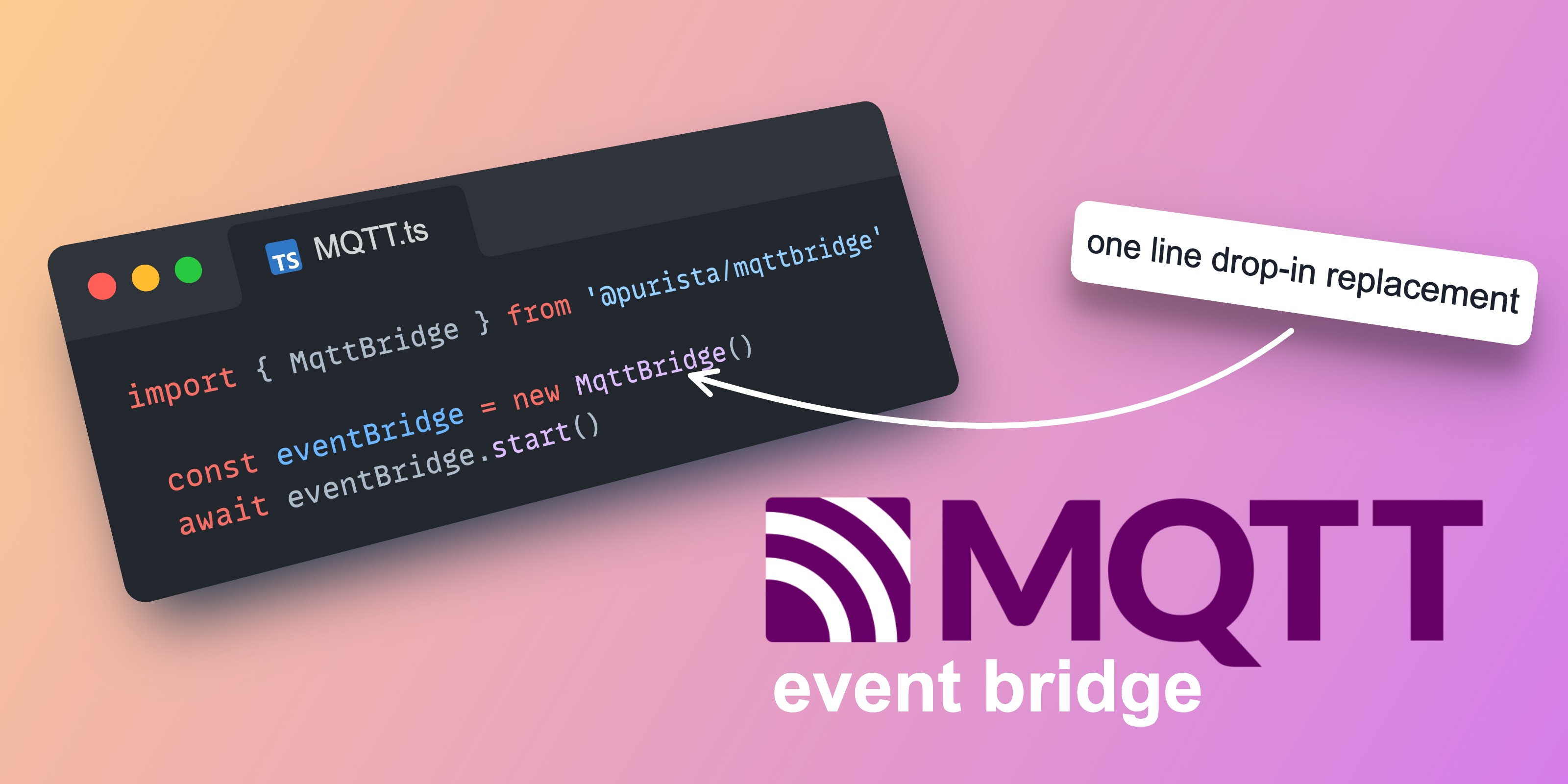
MQTT Event Bridge
MQTT with the popular mosquitto broker is one of the most mature and widely used messaging protocols.
The MQTT protocol version 5 has some interesting additions, like shared subscriptions, session ttl, message ttl and response fields. This reduces the gap between available broker features and our needs.
PURISTA provides the @purista/mqttbridge
Pros
- allows scaling
- fault tolerant
- MQTT is a mature protocol and widely used (IoT/edge)
Cons
- needs managing of an MQTT broker
- only MQTT 5 is supported
- hard to handle dead letters
Configuration
The MQTT event bridge uses the unified configuration schema as all event bridges.
API documentation
Usage example
import { MqttBridge } from '@purista/mqttbridge'
const eventBridge = new MqttBridge()
await eventBridge.start()Topic names
The MQTT protocol relays on topics for message publishing/subscribe.
PURISTA is using the following schema for topics:
const topicPrefix = config.topicPrefix
const empty = config.emptyTopicPartString
const path join(
topicPrefix,
convertToSnakeCase(message.messageType),
convertToSnakeCase(message.principalId || empty),
convertToSnakeCase(message.tenantId || empty),
convertToSnakeCase(message.sender.instanceId),
convertToSnakeCase(message.sender.serviceName),
convertToSnakeCase(message.sender.serviceVersion),
convertToSnakeCase(message.sender.serviceTarget),
convertToSnakeCase(message.eventName || empty),
convertToSnakeCase((message as Command).receiver?.instanceId || empty),
convertToSnakeCase((message as Command).receiver?.serviceName || empty),
convertToSnakeCase((message as Command).receiver?.serviceVersion || empty),
convertToSnakeCase((message as Command).receiver?.serviceTarget || empty),
)This allows to have subscriptions for very specific messages. The MQTT 5 topic alias feature is used for mapping a message to the correlating subscription.
Shared subscriptions
Subscriptions are per default MQTT 5 shared subscriptions. Shared subscriptions in MQTT are simple to use. It only requires prefixing the topic with $share and a shared subscription name (pubsub name).
::: caution Be aware The shared subscription name (pubsub name) must differ from the topic prefix. Otherwise shared subscriptions are not working (at least in mosquitto). $share/purista/purista/... does not work, while $share/purista_group/purista/... is working :::
To align these settings, the configuration provides shareTopicPrefix which defaults to $share and should work on most of the brokers. If the broker might require some different prefix, you can align it here. The shareTopicName can be used to set a custom name for your shared subscriptions to prevent name collisions or to use a broker, which is a multi-tenant broker. It defaults to sharedpurista.
Message timeouts, QOS, and subscriptions
The configuration for the MqttEventBridge differentiates between command & command responses and subscriptions.
Commands and command responses are basically short-living messages, which are only needed for the time a command is requested, executed and the result is returned. The timeout handling of invocations will be triggered, if commands can't be handled within the given time. Because of this, we can set command requests and responses to lower QOS and set a low MQTT message expiry time. This will reduce resource consumption and prevent the broker from storing unnecessary data for a long time.
You can use the MQTT event bridge config options qosCommand and defaultCommandTimeout to align it to your needs.
On the other hand, subscriptions will need to receive every subscribed message at least once, and they can run at any time. To prevent timing issues, a few things will automatically happen.
If a command request has the eventName field set as an event name, the command request will be published with the defaultMessageExpiryInterval message expiry time. Otherwise, the defaultCommandTimeout is used, which is most likely a much smaller value. Also, the QOS level is set to the higher value of qosCommand or qoSSubscription. The value of qoSSubscription will most likely be the same or a higher value than qosCommand. This will ensure subscriptions are getting the command request message - if an event name is set. Command responses will have the same behavior.
Hints
Ensure settings across instances
Remember to ensure, that QOS, prefixes, and so on are the same on every event bridge instance. Otherwise, you might get some unexpected behaviors.
OpenTelemetry
PURISTA is using the MQTT 5 user properties feature to add the OpenTelemetry information to each message, as recommended: https://w3c.github.io/trace-context-mqtt/.
